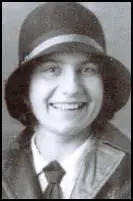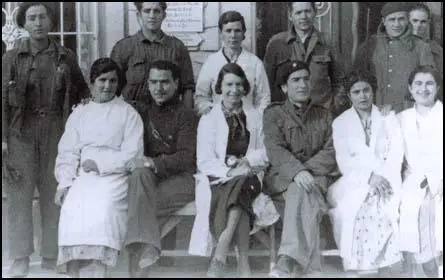Penny Phelps

Penny Phelps, the daughter of an unemployed labourer, was born in Tottenham on 24th April 1909. As a child she saw a Zeppelin being shot down during the First World War: "I remember the Zeppelin coming down over Cuffley, it got caught in the search lights above the railway... I saw it disintegrating and coming down, and everybody was shouting and clapping."
One of ten children, she left school at the age of thirteen. She worked in factories, in service and in dressmaking. In 1927 she began training as a nurse at the Eastern Fever Hospital in Homerton. She completed her training as a State Registered Nurse at Charing Cross Hospital.
In January 1937 she became a nurse working for the International Brigades during the Spanish Civil War. After the offensive at Jarama, Phelps became Medical Officer to the Garibaldi Brigade. When she arrived, she found a ward full of men suffering from scarlet fever: "I went in and... there were pots of urine... all over-flowing with urine, bits of bread and crusts all over, no pillows, people in clothes and no clothes... it was terrible, and the windows were closed."
Phelps organised staff for a programme of thorough disinfection, fumigation, and inoculation for the entire battalion of 600 men. Eventually she contacted typhoid and she was forced to return to England. Over the next few months she spoke at meetings established to raise funds for the British Medical Aid Unit. "The demand for speakers from the Spanish Medical Aid Committee in London was very great... I addressed meetings practically every night in and around London... An old lady of 70 years who came up to me as I was about to go home after a very successful meeting in Hornsey Town Hall. This old lady pressed something close in my hand... She made a hurried exit, and I was left standing in the hall holding a cheque for £100 for the Spanish Medical Aid."
Phelps was very critical of the British government's attitude towards the Spanish Civil War. "I don't know what this government is doing. They don't seem to want the Spanish people to win. we must help them to change the awful conditions of life out there."After making a full recovery Phelps returned to Spain to serve with the XVth Brigade. While stationed at Quintanar she fell in love with Roberto Vincenzi, a young Italian member of the International Brigades. They made plans to marry after the war but they were separated when Vincenzi was sent to another part of the front-line.
At Brunete six people in her medical unit were killed. Phelps was herself seriously wounded in the spring of 1938 and was forced to return home. During her convalescence she met Dr Michael Feiwel and they began a relationship. Phelps wrote to Vincenzi: "I felt that living in Spain and living in England were two completely isolated experiences. During this period, Roberto, I had not forgotten you - far from it - but what I felt about the whole of my life in Spain I felt also about our relationship. I loved you in Spain - you stood for everything out there - you were part of it - you were a real fighter for the rights of mankind. I still do love you, Roberto, but in a different way... But in England, while I was ill, Spain seemed so remote - almost another world. And now there is something I want to tell you Roberto. While I was feeling like this, there was someone who helped me to get well again." Phelps then went onto tell Vincenzi that she had married Dr. Feiwel.

Roberto Vincenzi received the letter in a refugee camp in France. He replied: "I thought that the wounds to your body caused by the fascist plane had taken your life... Penny, you have married - you have done the right thing! I do not reproach you for it at all... In my situation, how would I have been able to keep my promise? I find myself here surrounded by barbed wire, with no prospect of freeing myself, without knowing when we will leave here, and in the certainty that the bourgeoisie of whatever country we go to will make it difficult for us to find work, and besides, they will impose restrictions on our movements, seeing them as suspect. We are subject to imprisonment, persecution, unemployment, etc., because we will continue with our fight, even when we must conduct it secretly, the only thing that matters to us is to arrive at the moment when all humanity is liberated from capitalist oppression... In your letter you tell me not to feel bitterness towards your husband. What blame has he? How could I nuture mistrust for a man who would give you the happiness that I am unable to give you. He has given you his name, the pride of bearing it and bringing it honour. Be a worthy companion for him."
Penny Phelps kept in touch with Roberto Vincenzi until the German Army invaded France in the summer of 1940. Like many soldiers of the International Brigades living in refugee camps in France, Vincenzi was probably executed during the occupation.
In the Second World War Phelps worked at a First Aid Post. Later she became a social worker for Physically Handicapped Youth. She also helped her husband in the running of his private medical practice in Harley Street. Phelps published her memoirs, English Penny , in 1992.
Penny Phelps Feiwel died in January 2011.
Primary Sources
(1) Penny Phelps, interviewed by Angela Jackson (22nd February, 1996)
I remember the Zeppelin coming down over Cuffley, it got caught in the search lights above the railway. And I can remember the bang, bang. I presume of the anti-aircraft, and seeing this Zepp being caught and disintegrating and coming down, and everybody was shouting and clapping... but I, young as I was, had no similar feeling. I just felt terrible, terrible, that this should have happened and the people being burnt.
(2) Penny Phelps letter to Roberto Vincenzi (24th June, 1939)
I felt that living in Spain and living in England were two completely isolated experiences. During this period, Roberto, I had not forgotten you - far from it - but what I felt about the whole of my life in Spain I felt also about our relationship. I loved you in Spain - you stood for everything out there - you were part of it - you were a real fighter for the rights of mankind. I still do love you, Roberto, but in a different way... But in England, while I was ill, Spain seemed so remote - almost another world. And now there is something I want to tell you Roberto. While I was feeling like this, there was someone who helped me to get well again.
(3) Roberto Vincenzi letter to Penny Phelps (1st July, 1939)
I thought that the wounds to your body caused by the fascist plane had taken your life... Penny, you have married - you have done the right thing! I do not reproach you for it at all... In my situation, how would I have been able to keep my promise? I find myself here surrounded by barbed wire, with no prospect of freeing myself, without knowing when we will leave here, and in the certainty that the bourgeoisie of whatever country we go to will make it difficult for us to find work, and besides, they will impose restrictions on our movements, seeing them as suspect. We are subject to imprisonment, persecution, unemployment, etc., because we will continue with our fight, even when we must conduct it secretly, the only thing that matters to us is to arrive at the moment when all humanity is liberated from capitalist oppression... In your letter you tell me not to feel bitterness towards your husband. What blame has he? How could I nuture mistrust for a man who would give you the happiness that I am unable to give you. He has given you his name, the pride of bearing it and bringing it honour. Be a worthy companion for him.
(4) Penny Phelps, interviewed by Angela Jackson (22nd February, 1996)
The demand for speakers from the Spanish Medical Aid Committee in London was very great... I addressed meetings practically every night in and around London... An old lady of 70 years who came up to me as I was about to go home after a very successful meeting in Hornsey Town Hall. This old lady pressed something close in my hand... She made a hurried exit, and I was left standing in the hall holding a cheque for £100 for the Spanish Medical Aid.
(5) After the war Penny Phelps wrote about her experiences during the Spanish Civil War.
I went to Spain in January 1937 under the auspices of the Spanish Medical Aid Committee accompanied by two other nurses. I was interviewed at Albacete and told I would be joining the International Brigades. My destination, however, was kept secret from me since I was, by then, under military discipline. As the guns were rumbling all the time my first night was rather disturbed.
The next day we were on the move taking mobile theatre equipment with us and getting it ready inside a school. Casualties began to roll in and our work went on until the early hours of the morning.
The wounded arrived in ambulances, on open lorries or any other available transport. They must have had a very hard time because the roads in this region are rough and it is mountainous. We were quite near the front.
I slept until 9 a.m. and then we had to begin operating until 6 o'clock the next morning. I kept thinking we had just about finished, but more and more casualties arrived and the small hospital became overcrowded. Many of the wounded were left out in the yard from lack of space inside the school building, which must have been extremely stressful because it was very cold and there was often snow on the ground.

